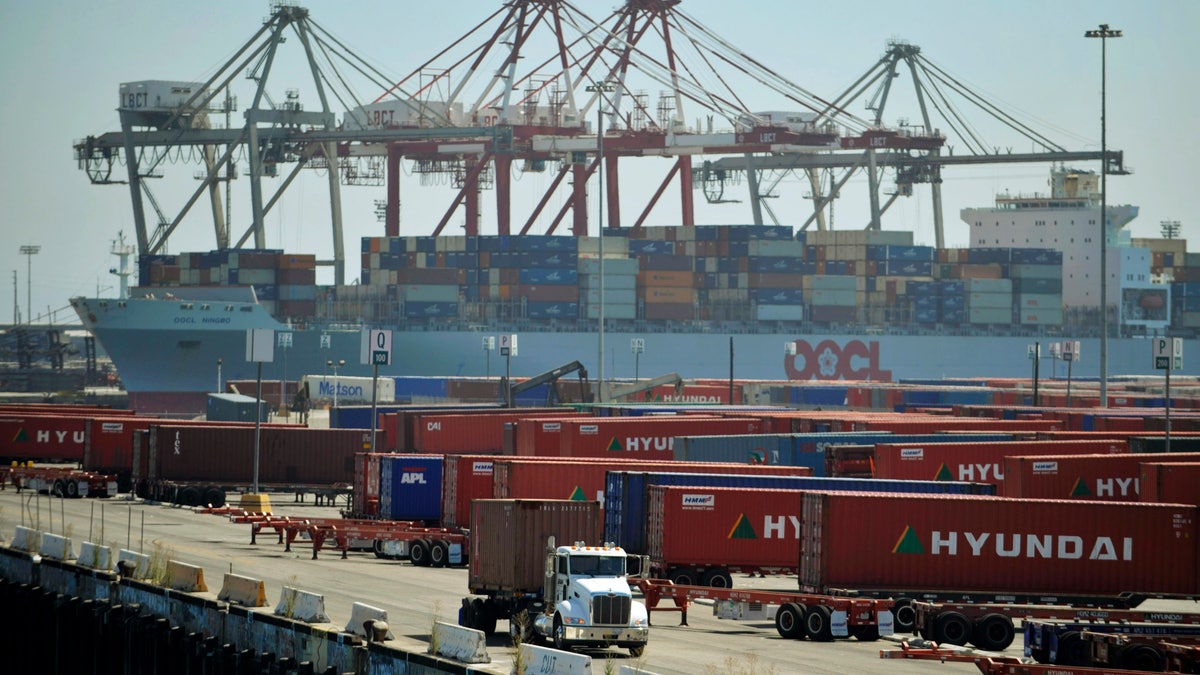
Aug. 24, 2009: A truck passes containers at the Port of Long Beach in Long Beach, Calif. (AP)
LOS ANGELES – Spreading labor strife at major West Coast seaports is exacerbating problems that importers have had getting products to market, threatening the on-time delivery of some holiday goods.
Until this week, dockworkers and their employers were negotiating a new contract with little of the public drama that characterized past talks.
No longer. The association representing companies that ship cargo in and out of 29 West Coast ports and manage containers once onshore is accusing the dockworkers union of deliberately slowing work to gain bargaining leverage. Their contract expired in July.
The Pacific Maritime Association said Thursday that the union isn't dispatching enough workers at the twin ports of Los Angeles and Long Beach who are skilled at loading containers from dockside yards onto trucks and trains. The report comes amid months of unrelated congestion at the ports. On Monday, the association said crane operators with the International Longshore and Warehouse Union in Washington state are moving cargo at half-speed.
According to U.S. trade data, cargo worth $892 billion crossed the docks from San Diego to Seattle in 2013, accounting for much of the trade with Asia. A lockout in 2002 cost the economy billions of dollars.
Cargo at Los Angeles and Long Beach, by far the busiest ports in the nation, has been taking unusually long to clear the docks since the summer. Both sides agree a big cause of the congestion is a lack of truck chassis that carry containers off sprawling lots and into the flow of commerce.
Now add what employers term a work slowdown, and the twin ports are approaching "the brink of gridlock," the association said in a statement.
A spokesman for the union did not deny a slowdown, but he also blamed employers for the congestion.
Cargo flow is gummed up for several reasons that predate the recent labor issues, union spokesman Craig Merrilees said. There has been a shortage of not just truck chassis, but also drivers to move containers to distribution centers, an issue Merrilees attributed to poor wages and exploitative working conditions.
"The problems are industry caused, self-inflicted and serious," he said.
Past negotiations have seen work slowdowns. During contract negotiations in 2002, employers locked out longshoremen following slowdown allegations.
Whether the current problems are a prelude to a breakthrough or deeper strife is unclear. At least one outside group with a big stake in the outcome is worried.
"The threat of a West Coast port shutdown is creating high levels of uncertainty in a fragile economic climate," the National Retail Federation wrote Thursday in a letter to President Barack Obama that was signed by 105 trade associations representing an array of industries.
The federation asked that a federal mediator get involved.
The problems come as some importers are trying to hustle a last rush of holiday goods into their warehouses.
The largest stores already have their cargo or, anticipating problems like those now materializing, routed goods to ports on the East Coast, said Frank Layo, a supply-chain expert at the management consultancy Kurt Salmon. But smaller importers, particularly of toys and fashion, are vulnerable, he said.
"There's a building backlog of boats that can't pull up to a berth," Layo noted.
A week ago, there were 10 ships anchored off the coast outside Los Angeles and Long Beach; on Thursday, 14 ships were waiting a space at the docks.





















